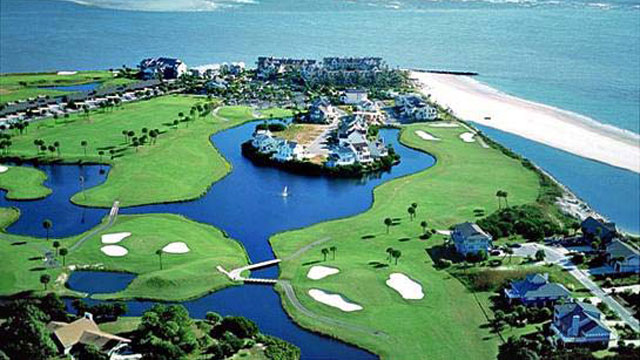NEWS
Jack Kilgore's bet turned Fripp Island into Lowcountry destination
By David Lauderdale
Published on

HILTON HEAD ISLAND, S.C. – Jack Kilgore knew nothing about real estate or resorts – or even the Lowcountry – when he decided to buy a jungle known as Fripp Island.
He was on a fishing trip with a friend, his first venture into Beaufort County, when a side trip to Fripp convinced him to uproot his young family and bet everything he had on a sketchy plan others told him was crazy.
But before he died Dec. 17 at age 88 in his native Columbia, Kilgore had seen that dream come true. His personal gamble paid off well, and Fripp had become a place where people loved to live and visit.
"Fripp Island is one of our biggest assets," said veteran Beaufort business leader Richard Gray Sr. "It's impossible to calculate what it has meant to have that many people come to visit and buy property over the years."
Kilgore first saw the island in March 1960. By September, a front-page story in The Beaufort Gazette announced he had pieced together investors to buy the 3,500-acre island from 16 local men who owned it as a hunting and fishing retreat.
Kilgore was 33 and selling trucks for a living. He and his wife, Anna Jean "AJ" Kilgore, had three little boys and fourth on the way. They chipped in their $10,000 life savings, but at first Kilgore could find only two friends who would match him.
"They were the only ones who didn't think I was crazy," he told Page Putnam Miller for her book, "Fripp Island: A History."
'BEG PEOPLE'
Kilgore eventually found 14 other investors. That gave them the down payment for a dicey, $524,000 investment.
It was a nice payoff for the hunters who bought the place for $40,000 six years earlier. They had recouped $25,000 of that by selling timber.
Still, it was a tough sell for Kilgore. Miller quotes Kilgore: "One owner warned me that the individuals involved couldn't agree on the time of day."
The purchase was easy compared to the next challenges that seemed to come in like the tides. There was no bridge to the island. Bonds had to be sold to build a private bridge in 1963, but first the state had to be convinced to extend the road to it on Hunting Island.
A development plan was pieced together with the help of Charles E. Fraser, who founded Sea Pines on Hilton Head Island in 1957. But the water beneath Fripp was salty, and fresh water from St. Helena Island wells had to be piped 12 miles.
Kilgore and his right hand, chief financial officer Roy A. Krell Sr., had to put in roads, an inn, restaurant, golf course and marina.
His son Glen Kilgore of Beaufort said life on a deserted island was a dream come true for the kids. But for his father, it meant long days trying to create a resort in the morning and working construction in the afternoon.
"He had to beg people to come to Beaufort," Glen Kilgore said. "Back then, you were either a farmer or a shrimper. People said Beaufort was the place the bus came to turn around."
'IMAGINATION'
Kilgore took a slideshow to every county in the state.
When a prospect arrived on the island 20 miles from town, Kilgore had a ritual to help them catch the feeling that he had felt. The crescendo of the grand tour was a ride down the beach in his Ford Bronco. AJ would fry fish the boys just caught, and piece by piece, the dream began to take shape.
The first oceanfront lot sold for $2,500 in 1963. To give a hint how this would help Beaufort County, the real estate taxes on the whole island totaled $315 in 1961.
Glen Kilgore said his father worked hard, stayed out of debt, and had the gift of seeing things well ahead of most people.
"What Kilgore lacked in professional training, he made up for with passionate determination and skills of persuasion," Miller wrote.
Retired Beaufort banker F.W. "Willie" Scheper said, "He had imagination and that led to determination. If you've got imagination, you can fill in the blanks."
Other community leaders to support Kilgore's wild dream included the late John Trask Sr. and Joab Dowling.
Scheper said some banking rules may have been bent to help Fripp Island, but it was achieved by hard work.
"I admired him for his courage and his desire for change," Scheper said. "They came through tough times, but worked through them. They did it with very little money. We could all learn a lot from that."
Glen Kilgore said his father sold at a good time. His interest was sold for $3.5 million in 1972, before the oil embargo and sky-high interest rates hammered the Lowcountry later in the decade.
They moved back to Columbia, but bought a vacation home next door to Charles Fraser. And they were happy to be back for Fripp's 50th anniversary in 2010.
By then, it had 2,300 homes or condominiums, two golf courses, six restaurants of various sizes, five gift shops and a racquet club.
"I wanted a low-density, non-commercialized island," Kilgore told the Gazette in the anniversary year. "I would have never dreamed Fripp would have that number of houses today."
This article was written by David Lauderdale from The Island Packet Online and was legally licensed through the NewsCred publisher network.
